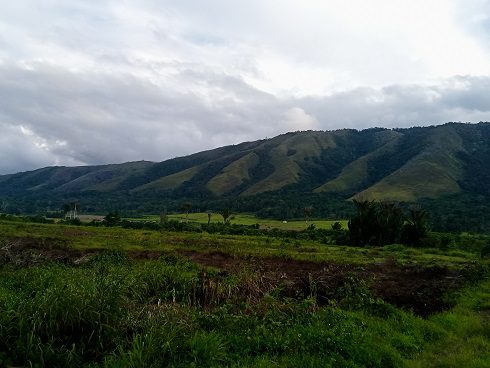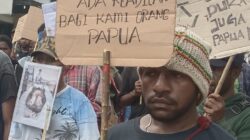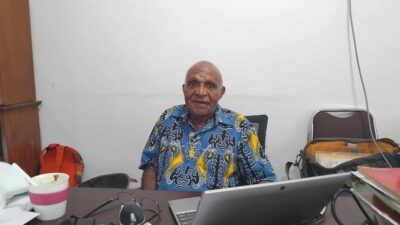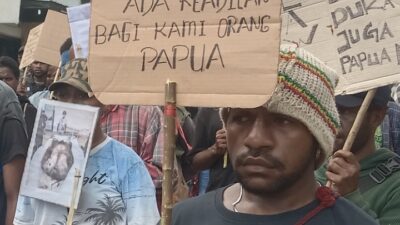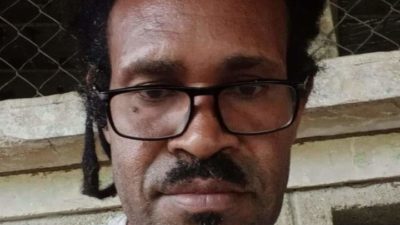Manokwari, Jubi–Since the West Trans Papua Road was established in 2014, residents of Kebar Valley in Tambrauw Regency have been conflicted as Bintuni Agro Prima Perkasa Ltd. (BAPP) planned to open a corn plantation.
BAPP entered the Kebar area initially through an oil palm plantation permit in 2014. The people of Kebar refused but the company returned to Kebar in 2015 with officials from the Tambrauw Agriculture Office.
Jubi and Project Multatuli met residents in several villages in Kebar Valley on October 19, 2022. The team collected stories from residents about the West Trans Papua Road that crossed the area and became the entry point of investment in Kebar.
We heard a lot from mama-mama Kebar, or the women of Kebar. Sarlota Auri is one of the residents who has customary rights in the area. She tells the story of the beginning of BAPP, which offered her Rp 2 million (USD 135) in place of releasing her off her customary right.
She turned down the offer as she was worried the company would turn the area into an oil palm plantation in the future despite claiming themselves to be a corn plantation today.
“The first time they came, they promised to use only two hectares. But the heavy equipment continued to operate. We learned from the oil palm case in Manokwari so we refused the BAPP plan because we were afraid that they would turn our land into oil palm plantation under the pretext of planting corn,” she said.
The corn plantation in the Kebar valley surrounds the settlement in Jandurau II Village. This village was established as a result of the expansion of Jandurau I Village in the East Kebar District. According to residents, the corn plantation covers more than 19,368 hectares.
Jandurau II Village is a portrait of a village surrounded by corn plants owned by BAPP. Residents seem helpless living in the middle of the company’s cornfields. The distance between the cornfield and the village is no more than 1 meter, separated only by a road and a wooden fence.
Elvira Anari recounts how her family first lived in Jandurau I Village. When Tambrauw Regency was expanded, her father took them to a new location and built a new village. “This village existed before the company entered,” she said.
In the village there were only 14 houses inhabited by one descendant. Twelve of them are old buildings. The two villages, Jandurau I and II, are not far apart, separated only by a cornfield owned by the company.
“We built 12 old houses, while the otther two semi-permanent houses were built with village funds. This is all for the community,” said Oni Sailonari, secretary of Jandurau II Village.
According to Oni, since the corn company started operating, no villagers have worked at the company. The employees are from other villages and people outside of Kebar.
“Since the beginning of BAPP, the residents have not been interested in working at the company,” he said.
The company’s presence makes residents uncomfortable due to air pollution and residents’ livestocks often die a sudden death. The sudden death of pigs, chickens, and cows cultivated under the West Papua Government’s assistance program was allegedly due to the company’s use of rat poison on the plantation land.
“We have reported this matter to the company several times, Mama Sarlota’s livestocks included, but they did not respond,” said Oni.
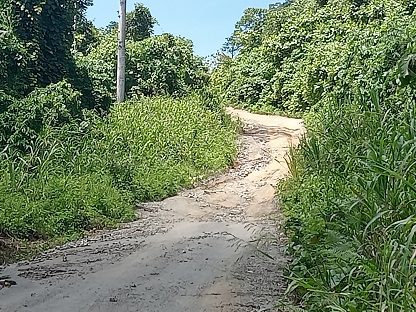
Kebar residents took to the street
In August 2018, a majority of residents in Kebar protested against the Bintuni Agro Prima Perkasa Ltd. The people rejected the corn plantation in the Kebar Valley area, which had been operating for five years.
Residents from the villages of Arumi, Wasabeti, Wanimeri, and Kebar walked across the main Trans Papua Road to the company office located between Jandurau I and Jandurau II villages.
“Almost all residents from East Kebar to West Kebar, even the GKI Church was involved at that time in the protest to reject the company’s presence at our land,” said Elvina Anari.
The community’s reason for rejecting the company, apart from defending their customary land, is because the company entered the land through untruthful manners.
“The company gathered the landowners and gave Rp 50 million to each clan but the Manimeri Clan and the Ariks Clan, who were given Rp 100 million,” said Elvina.
“The company claimed they wanted to improve the welfare of the community. But it was a lie, we are still poor,” said Elvina.
The company at that time also promised to provide education and build a hospital. However, even though the company has been running for several years, none of these promises have been realized.
“The only one benefiting from the company’s presence are the employees. We customary land owners only get Rp 1 million every month,” she said.
However, residents admitted the corn business prospect was quite good as every harvest transported out of the area needed at least seven trucks.
Sago and red fruit no more
The corn plantation was once a sago and red fruit plantation owned by residents. Since the company took over, the sago and red fruit have been displaced. Only in a few locations can sago trees still be seen. Even then, they belong to several clans that insist on defending their land, such as the Ariks Clan.
“Indeed, during the preparation stage, the Ariks Clan was given Rp 100 million. But I kept the money in the bank and never used it. When I saw that the people rejected the company, I returned the money to the company,” said Samuel Ariks from the Ariks Clan, one of the customary landowners.
Not only sago and red fruit but ironwood, matoa wood, and other plants also disappeared. Samuel told us, when the company cleared the land, operators were already told to bury the wood in the ground. “But when we looked away, they dug it up. This was carried out around 2018 and 2019,” he said.
Samuel Ariks admitted that the existence of the West Papua Trans Road made the community happy because access to other areas was easier like never before. However, on the other hand, the presence of the road has robbed the people of their natural resources through the presence of plantations from outside. (*)
This report is a collaboration between Jubi.id and Project Multatuli to record stories from Trans Papua Road.


